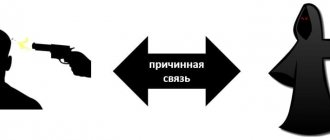Among the crimes provided for by criminal law is fraud. It is provided for in Art. 159 of the Criminal Code of the Russian Federation and describes situations where a criminal takes possession of the victim’s property using deception or abusing the trust that was previously placed in him.
Let us consider what the elements of this crime include, and how it differs from similar types of criminal acts.
Compound
The theory of law provides that the composition of any criminal act provided for by criminal law includes four main elements . In relation to Art. 159 of the Criminal Code of the Russian Federation this represents the following:
- The object of a crime is something that is harmed as a result of the actions of the perpetrator. In relation to Art. 159 of the Criminal Code of the Russian Federation, the object will be property and relations in society concerning the distribution of property and material goods. Because of this, the article describing this type of crime is placed in Chapter 21 of Section VIII of the Criminal Code of the Russian Federation.
- The objective side of fraud is what exactly the perpetrator did. To qualify under Art. 159 of the Criminal Code of the Russian Federation, it is necessary that certain actions be taken. They are expressed in the fact that the criminal receives other people's money or other property, and uses for this either deception or the trust that the victim places in him.
- The subject is the person who commits the crime. This can only be a person who is capable of answering for his actions (competent), and who has already reached 16 years of age at the time he committed criminal acts;
- The subjective side is the attitude of the criminal to the actions he commits.
Fraud is committed only with intent. It cannot be committed through negligence: a fraudster must always have direct intent and a selfish goal. If a person takes possession of someone else’s property through deception, but the goal is not to turn the stolen property into his own property, the actions will be qualified under other articles of the Criminal Code of the Russian Federation. For example, if a criminal, using trust, takes possession of a hunting rifle in order to commit murder, his actions will be qualified under Art. 105 and 226 of the Criminal Code of the Russian Federation, and not under Art. 159. On the contrary, if someone, through deception, takes possession of an expensive collectible gun belonging to another person precisely as a value, this will precisely be fraud.
The role of the receipt
Having a receipt in hand, you can go to court with a statement of claim. If the receipt is correctly drawn up, the court will recover money from the debtor, but it is unknown whether the creditor will receive his money. As a rule, the scammer does not have money.
If there is a receipt, there are no grounds for initiating a criminal case . Everything looks like a civil law relationship and there is no criminal intent.
If we consider the case in relation to one receipt, then the intent to commit fraud cannot be proven. But if you evaluate ten or twenty receipts, you will see ongoing fraud with direct intent.
Qualifying features and parties
Like many other crimes, fraud includes not only the general elements, but also special characteristics that serve for additional qualifications . In Art. 159 of the Criminal Code of the Russian Federation, such signs are provided for in parts 2 - 7. Part 2 provides for liability for a crime that was either committed by a group of persons who committed a preliminary conspiracy, or the victim suffered significant damage.
Thus, this composition differs from the general one in the following:
- Number of subjects – at least two;
- The subjective side is that the actions of the perpetrators were pre-planned and prepared.
Important! With the exception of Part 5 of Art. 159 of the Criminal Code of the Russian Federation, for any theft the significance criteria established by Note 2 to Art. 158 of the Criminal Code of the Russian Federation. The significance of the damage is determined based on the circumstances of the case, but in any case the victim must lose at least 5 thousand rubles.
Part 3 art. 159 has the following features:
- A subject is a special person, a person endowed with authority.
- The objective side is that the culprit used his official capabilities.
Also, actions that resulted in major damage are qualified under this part. It is determined in accordance with Note 4 to Art. 158 and must be at least 250 thousand rubles. For part 4 tbsp. 159 qualifying features will be:
- Subjects - there are several of them, and they are members of a group organized to commit one or more crimes. Signs of organization are determined in accordance with Art. 35 of the Criminal Code of the Russian Federation and Resolution of the Plenum of the Armed Forces of the Russian Federation No. 12 of 2010.
- The subjective side is preliminary planning and preparation for fraud.
- The objective side is that the actions of the criminals are coordinated, the tasks are distributed.
In addition, fraud is classified under this same section, regardless of the number and organization of the criminals, if the damage:
- It was especially large, that is, over 1 million rubles.
- It was expressed in the fact that the victim was deprived of his home.
Part 5-7 art. 159 have common qualifying features. They are that these parts relate to liability for fraud committed in the course of commercial activities.
Hence:
- The subject can be either an individual entrepreneur or a person acting on behalf of a commercial organization.
- The victim must also be an individual entrepreneur or the owner of a commercial legal entity.
These parts differ depending on the amount of damage to the victim:
- Part 5 – significant damage. They are recognized as an amount of at least 10 thousand rubles.
- Part 6 – large, that is, more than 3 million rubles.
- Part 7 – especially large, over 12 million rubles.
More details about fraud on a large and especially large scale are discussed in our material.
Important. In relation to Parts 5 – 7 of Art. 159 of the Criminal Code of the Russian Federation general rules on the amount of damage in case of theft, established by the notes to Art. 158 of the Criminal Code of the Russian Federation do not apply. Here you need to be guided by notes 1 – 3 already to Art. 159.
Relevance and admissibility of evidence
According to Art. 59 of the Code of Civil Procedure of the Russian Federation “The court accepts only that evidence that is important for the consideration and resolution of the case.” Materials not related to the circumstances of the case are excluded from the list of evidence. The remaining evidence must be admissible.
Inadmissible evidence is listed in Art. 75 of the Criminal Code of the Russian Federation . They cannot be used as the basis for the accusation, but they cannot become evidence for the defense. This evidence has no legal force. The law refers to the following evidence:
- Testimony of a suspect or accused, given during the pre-trial investigation in the absence of a defense lawyer and not confirmed in court.
- Testimony of the victim, witness based on guesses, rumors, assumptions.
- Testimony of a witness who cannot confirm the source of his knowledge.
- Items, documents and information included in the lawyer’s proceedings.
- Other evidence obtained in violation of the law.
All interrogations of the suspect or accused must be carried out with the participation of a defense lawyer with whom an agreement has been concluded. Even in the event of a written refusal from the defense attorney, all interrogations of the suspect or accused will be inadmissible evidence.
Rumors, conjectures, assumptions cannot be used as the basis for accusations. Accordingly, the testimony of a witness and a victim based on conjecture cannot be admissible. A witness can talk at length and interestingly about something, but still not say how he knows it. Such a fruit of a far-fetched story cannot be recognized as evidence.
Since 2022, the law has prohibited the inclusion of evidence presented by a lawyer in criminal cases. The investigator is in charge of the case and collects evidence . A lawyer can act through an investigator or a court. Evidence collected by a lawyer independently is considered inadmissible.
The last fifth point of the list of inadmissible evidence includes other evidence obtained in violation of the law. This point is quite broad. It covers almost any evidence that was obtained in violation of the law. For example:
- evidence of criminal activity obtained as a result of a search conducted without witnesses;
- valuable documents obtained as a result of a seizure made by an investigator who was not allowed to participate in the proceedings.
Formal and material elements and types of this crime
To qualify crimes, it matters what type they belong to. In the theory of criminal law, it is customary to distinguish the following types:
- Formal - the crime is committed as soon as the perpetrator has performed certain actions.
- Material. It differs from the formal one in that it requires the occurrence of dangerous consequences, and the actions themselves, in isolation from their result, may not be considered criminal.
- Truncated. Here, in fact, responsibility begins from the moment of committing certain actions, as in the case of a formal composition - but for qualification it is not even necessary that the actions be completed; one attempt is already enough for responsibility.
Which of these categories of compounds does fraud fall under? To determine this, you need to consider the following:
- Art. 159 and similar articles providing for liability for fraud do not say anything about attack, attempt or other possibility of punishment for a crime where the goal of the perpetrator has not yet been achieved (unlike, say, the robbery mentioned above). Therefore, the composition is not truncated. The choice is between material and formal composition.
- Is it necessary to perform certain actions in order to recognize a crime as fraud? Yes. The article of the code indicates that this crime is committed by either deception or by using for evil the trust that the criminal enjoyed with the victim.
- Is the onset of dangerous consequences for society required? Yes, it is required. Art. 159, describing the composition, uses the term “theft”. It, in turn, is revealed in note No. 1 to Art. 158 of the same code.
According to the definition given in this note, theft should be understood as the seizure or conversion for someone else's benefit of property belonging to the victim. Consequently, until the criminal takes possession of material goods (or until he transfers them to another person - theft can also be committed in favor of a third party), there is no need to talk about a crime being committed.
Thus, we can draw an unambiguous conclusion: fraud is one of the crimes involving material elements . The actions taken by the perpetrator in themselves do not constitute a crime.
Important. In the event that the deception took place, but the criminal, for reasons beyond his control, was unable to take possession of someone else’s property, liability under Art. There won't be 159.
At most, we can only talk about attempted fraud.
To protect yourself from the actions of criminals, we advise you to familiarize yourself with common types and schemes of fraud, including the use of electronic means of payment.
Motive, purpose, emotions
Since fraud is one of the types of theft, the following conditions regarding the subjective side of the composition apply to it :
- Motive. Usually it is self-interest - however, we must remember that this is far from a mandatory factor.
“Noble fraud” is also quite possible, when the criminal, although he takes possession of other people’s valuables through deception or broken trust, then does not use them himself, but transfers them to someone free of charge. In particular, in the practice of investigating criminal cases, there have been situations when, when committing fraud with complicity, one of the group members voluntarily renounced his share in favor of an accomplice (for example, if he urgently needed money). Fraud did not cease to be a crime, but there was no mercenary motive in the actions of this person. - Target. It is precisely the alienation of someone else's property or the acquisition of rights to it. The purpose of this crime is always selfish.
- Emotional-volitional part. In order to qualify a crime as fraud, it is necessary that the perpetrator is aware of all the essential aspects of this crime. This means that he must know that he is appropriating other people’s values for free, and also using lies or using trust for evil.
Fraud with real estate shares
Lawyer Antonov A.P.
Recently, scams involving real estate shares have become particularly widespread.
Fraudsters buy shares in apartments and terrorize residents, extorting money. Imagine this situation.
You are relaxing at home after a hard day. Everything is as usual. Suddenly the doorbell rings. An unfamiliar citizen stands on the threshold, declaring that he has bought a share in your apartment and will now live with you. Before you have time to come to your senses, he is already bringing things in. Real nightmare?
Some people call this apartment raiding. Although this formulation is controversial. In any case, we are talking about a crime. Any person living in an apartment that is common shared property can become its victim. Not every owner of such an apartment understands what threatens him. And when he understands, it will be too late.
The schemers find an apartment that has several shared owners. Then they offer one of them to buy his share. He agrees. The reasons may be different.
For example, an ex-husband, who moved out of this apartment after a divorce, decided to annoy his ex-wife living there.
Moreover, the seller receives one amount for his share, and in the purchase and sale agreement they write another, adding several zeros to it.
After which someone comes to the apartment and claims his rights to part of the living space. Next, the main owner of the apartment is offered a choice: buy the second share at a price clearly higher than the market price or sell his own, several times cheaper than its real value. He, of course, rejects this proposal with indignation.
“No problem,” someone replies. “Then I’m free to do whatever I want with my part of the apartment.” I will rent it out. Now there are many guests from the southern republics in the city who are looking for shelter. I have a couple of candidates in mind. They are great guys who will try not to bother you. You just have to share the kitchen, bath and toilet with them. You're not squeamish, are you?
There are other threats as well. After all, there are many ways to turn a person’s life into hell in the living space that he recently considered his home. As a result, the unfortunate person is ready to accept any conditions.
It must be said that share hunters operate almost legally. However, they still have to step over the line of legality.
According to Art. 250 of the Civil Code of the Russian Federation, when selling a share in the right of common ownership, the remaining participants in shared ownership have the preemptive right to purchase it. They must be notified that this share will be sold. After which they have the opportunity to either purchase it or refuse, which allows them to sell the share to third parties. Fraudsters, in violation of this article, prefer to act without warning in order to catch the victim by surprise.
Therefore, victims in their statements of claim usually point first of all to a violation of Art. 250 Civil Code of the Russian Federation. However, for subjective reasons, the court may refuse the claim. This also happens.
Although the law requires the seller of a share to offer it first to other shareholders, it does not prohibit such transactions from being carried out without complying with this requirement. Therefore, Rosreestr quietly registers them.
And if the court nevertheless recognizes the transaction as invalid and obliges it to comply with Art. 250 of the Civil Code of the Russian Federation? In this case, the seller must offer his share to the other owners of the apartment at the price for which he sold it (in agreement with the buyer). And this price is unreal. This is the purpose of the scam - to sell part of the apartment at the price of the apartment itself. Naturally, the remaining share owners will refuse such an offer (an attempt to challenge this price in court will most likely be useless). And then the situation will return to the starting point.
Sincerely, lawyer Anatoly Antonov, managing partner of the law firm Antonov and Partners.
Still have questions for your lawyer?
Ask them right now here, or call us by phone in Moscow +7 (499) 288-34-32 or in Samara +7 (846) 212-99-71 (24 hours a day), or come to our office for a consultation (by pre-registration)!
Statute of limitations
It is possible to bring the perpetrator to justice before the statute of limitations has expired by drawing up and submitting an appropriate application to government agencies. The limitation periods for fraud provided for by criminal law are:
- In the general case (for Part 1 of Article 159 of the Criminal Code of the Russian Federation) – 2 years.
- For part 2 of the same article – 6 years.
- For parts 3 and 4 – 10 years.
- For parts 5 – 6 years.
- For parts 6 and 7 – 10 years.
At what point is deception considered complete?
When deciding the question of when a crime under Art. 159 of the Criminal Code of the Russian Federation becomes complete, one should keep in mind the resolution of the Plenum of the Armed Forces of the Russian Federation No. 48 of 2022.
It establishes the following:
- If the fraudster or persons associated with him have the opportunity to actually dispose of the victim’s property, the crime is over.
- If the acquisition of rights was used, then the criminal act is over when the perpetrator has the opportunity to legally dispose of the victim’s values as his own.
How exactly the perpetrators disposed of the property obtained as a result of fraud is immaterial. At the same time, an attempted crime, which is provided for in Art. 159 of the Criminal Code of the Russian Federation, there will be actions that will simultaneously have the following characteristics:
- The goal of the attacker is to seize the victim’s property.
- The crime was not brought to completion for reasons beyond the will of the perpetrator. If the fraudster himself, in the process of committing a criminal act, refused to achieve his goal, his actions may contain signs of other crimes, but there can be no talk of fraud specifically.
You will find more information about the moment and place of the end of the crime in a separate material.
If you need the help of a lawyer
If you want your interests to be represented by a neat and detail-oriented specialist with many years of experience in this type of crime, call or leave a request on the website. We accompany the client at all stages of the investigation, represent his interests in courts of various instances and take all effective measures to achieve the result that our client requires.
| Providing defense in criminal cases: | Price |
| Visiting detainees in pre-trial detention centers (places of deprivation of liberty) for the purpose of giving legal advice: | from 20,000 rub. |
| Participation of a defense attorney in a court hearing under Art. 125 Code of Criminal Procedure of the Russian Federation: | from 30,000 rub. |
| Participation of a defense lawyer in a court hearing when choosing a preventive measure, extension of the period of detention: | from 30,000 rub. |
| Protection of the client during the investigation, preliminary investigation before sending the criminal case to court | from 50,000 rub. |
| Defense of the principal in the court of first instance, if the defense attorney participated in the preliminary investigation: | from 30,000 rub. |
| Defense of the client in the court of first instance, if the defense attorney did not participate in the preliminary investigation: | from 50,000 rub. |
| Appealing the verdict, ruling, decision of the court of first instance to the appellate instance: | from 70,000 rub. |
| Appeal and protest of a court verdict, rulings and decisions in the cassation instance: | from 50,000 rub. |
| Protection of the principal in court by way of supervision | from 30,000 rub. |
| Organization of examinations, consultations with the participation of specialists, experts in various fields of activity | from 15,000 rub. |






